#Digital Tax Tools
Explore tagged Tumblr posts
Text
Unlocking Career Opportunities with "Mastering Indian Tax Planning and Return Filing"
In the evolving landscape of the Indian economy, taxation stands as a pivotal element driving the financial framework of both businesses and individuals. With the government’s dynamic regulatory changes, especially with the introduction of GST, the demand for knowledgeable tax professionals has surged. This presents a significant career opportunity for students and aspiring professionals eager to…

View On WordPress
#Career Development#Corporate Tax Strategy#Digital Tax Tools#Emerging Technologies in Taxation#Finance Education#Financial Analysis#Financial Career Pathways#Financial Literacy#GST Compliance#Hands-on Tax Practice#Income Tax#Indian Economy#Online Learning#Tax Advisory Services#Tax Consulting Careers#Tax Filing Skills#Tax Law Updates#Tax Planning#Tax Professional Training#Taxation Course
0 notes
Text
Crypto Portfolio Trackers
📊 Tracking your crypto investments made easy! Explore the top 5 #CryptoPortfolioTrackers: Blockfolio, Delta, CoinStats, CoinTracking & Kubera. Stay on top of your digital assets with the best tools. 📈💼 Read the full review now! #CryptoInvesting #Blockchain #CryptoTools
Crypto Portfolio Trackers, Keeping Tabs on Your Investments “An investment in knowledge pays the best interest.” – Benjamin Franklin In today’s fast-paced world of cryptocurrency, staying on top of your investments is crucial. With the rise of Crypto Portfolio Trackers, managing your digital assets has never been easier. But with so many options out there, which one should you choose? Let’s…
#Blockfolio Review#CoinStats Integration#CoinTracking Tax Reporting#Crypto Investment Tools#Crypto Investments#Crypto Portfolio Trackers#Cryptocurrency Management#Delta App Review#Digital Asset Tracking#Kubera Wealth Management
0 notes
Text
Key Trends in Portfolio Management Services in India 2025

Over the past ten years, portfolio management services in india has experienced significant expansion. There has been a significant shift in the way these services are provided and utilized by high net worth individuals and individual investors looking for complex investment solutions that complement their financial objectives.
Understanding the Modern Portfolio Management Ecosystem
Portfolio management services in India have moved far away from the buy and hold concept. Today, portfolio managers rely on advanced analytics together with deep market knowledge to produce customized investment propositions. It is the shift in the wealth management service offering based on the customization and the risk-adjusted returns.
Data-Driven Decision Making Reshapes the Industry
Technology innovation, particularly in the form of data analytics, is now included in the usage of investment portfolio management. Portfolio managers currently utilize artificial intelligence in analyzing the market patterns that may indicate possible investment opportunities or optimize asset allocation. It is a technologically advanced way of managing risks and possibly better returns for the investor.
Growing Momentum in ESG Integration
ESG factors have become the core element of portfolio management services in India. Growth in demand by investors in sustainable investments drives service providers in wealth management to fall in line with ESG metrics contained within the investment framework. The trend and an orientation to performance through this direction toward responsible investment are meant to be illustrated.
Democratization of Investment Expertise
Portfolio management services have become extremely accessible in India. The area of ultra-high-net-worth individuals, which has been a preserve for long, is now more inclusive. Investment portfolio management companies are lowering the minimum investment thresholds and are reaching out through digital platforms to serve a much wider client base.
Alternative Investments Take Center Stage
Alternative assets are becoming more and more popular among portfolio managers. These days, private equity, REITs, and structured products are all essential components of diverse portfolios. Such an evolution in investment portfolio management protects one against market volatility and also perhaps boosts returns.
Personalization Through Technology
Tailored portfolio products serve as a revolution in the package of overall portfolio management services rendered in India. Sophisticated approaches toward managing risks occur here. Sophisticated stress tests and scenario analyses enhance portfolio management service to be readier in various probable conditions brought by the marketplace. In other words, moves to make headways result in a kind of preserving wealth amid turmoil that concurrently supports the notion of continuous growth.
Financial Education End
India's leading portfolio management services have also realized the necessity of educating their investors. These include clients with continuous workshops, deep market insight, and transparent performance reporting. Better investing judgments are made by the investor with the aid of such knowledge.
The Way Forward
The future seems optimistic in portfolio management services through constant innovation in investment strategy and service delivery. As markets become more complex and interdependent, professional portfolio management will represent the ultimate source to help in achieving long-term finance success.
Transformational Impact on Wealth Creation
A suitable portfolio management service is one of the most significant factors in long-term wealth generation. Technological innovation combined with personalized strategy and professional know-how offers a powerful tool in the hands of investors to realize their financial objectives.
With the ever-changing investment landscape, the expertise of experienced portfolio managers is a must for coping with market intricacies and opportunities for growth. Such an environment pushes investors adopting sophisticated investment strategies for professional portfolio management, yet it goes in accordance with financial goals and risk tolerance. Ongoing evolution continues to reshuffle the very way Indians approach their wealth creation and preservation.
#portfolio trends#PMS India 2025#investment tips#asset allocation#ESG investing#fintech PMS#market insights#mutual funds#equity growth#passive income#wealth growth#PMS benefits#smart investing#risk analysis#fund strategies#PMS trends#digital tools#AI in PMS#tax efficiency#custom plans
0 notes
Text
Business Zakat Calculation in ALZERP Cloud ERP Software
Benefits of Using ALZERP for Zakat Calculation
ZATCA Compliant Software: ALZERP is designed to meet all ZATCA requirements, ensuring that Zakat calculations are accurate and compliant with Saudi tax regulations.
Efficient VAT Management: In addition to Zakat, ALZERP manages VAT reporting and compliance, providing an all-in-one solution for tax management.
Zakat Calculation Software: The built-in Zakat calculator simplifies the complex process of determining Zakat obligations, reducing errors and ensuring timely submissions.
Automated Tax Compliance: The software automates the tax compliance process, from calculation to submission, minimizing manual intervention and the risk of errors.
Zakat and Tax Automation: ALZERP integrates Zakat and tax processes, automating calculations, reporting, and compliance tasks.
Real-Time VAT Reporting KSA: The system offers real-time reporting, allowing businesses to stay up-to-date with their tax liabilities.
Saudi Tax Compliance Software: Tailored specifically for the Saudi market, ALZERP ensures businesses meet all local tax and Zakat obligations.
Tax Optimization Tool: By providing insights into Zakat and tax liabilities, ALZERP helps businesses optimize their financial strategies.
VAT Fraud Detection: The system includes features to detect and prevent VAT fraud, ensuring the integrity of financial transactions.

#ZATCA compliant software#VAT management#Zakat calculation software#Tax management system#ZATCA e-invoicing solution#Saudi tax compliance software#Zakat and tax automation#VAT reporting software KSA#ZATCA approved ERP#tax filing software#Zakat assessment tool#VAT return automation Saudi#ZATCA integration software#Saudi business tax management#Zakat and income tax software#Real-time VAT reporting KSA#ZATCA electronic invoicing#Saudi tax audit software#Zakat and VAT calculator#Automated tax compliance#ZATCA digital reporting platform#Saudi VAT reconciliation software#Zakat declaration software#Tax analytics for Saudi businesses#ZATCA-compliant e-invoicing system#tax planning software#Zakat and tax consultation tool#VAT management for Saudi SMEs#ZATCA data submission software#Saudi corporate tax software
0 notes
Text
Maximize your tax season efficiency with PDF editing tools! From seamless form filling to secure e-signatures, these tools simplify tax preparation like never before. #PDFEditing #TaxSeason #DigitalEfficiency
0 notes
Text
🗣️THIS IS WHAT INCLUSIVE, COMPASSIONATE DEMOCRACY LOOKS LIKE
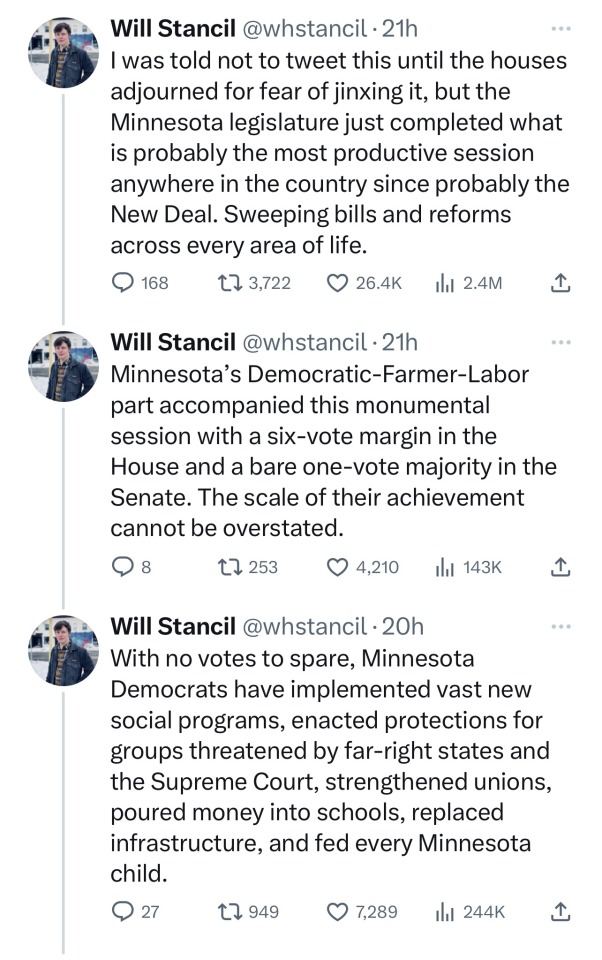
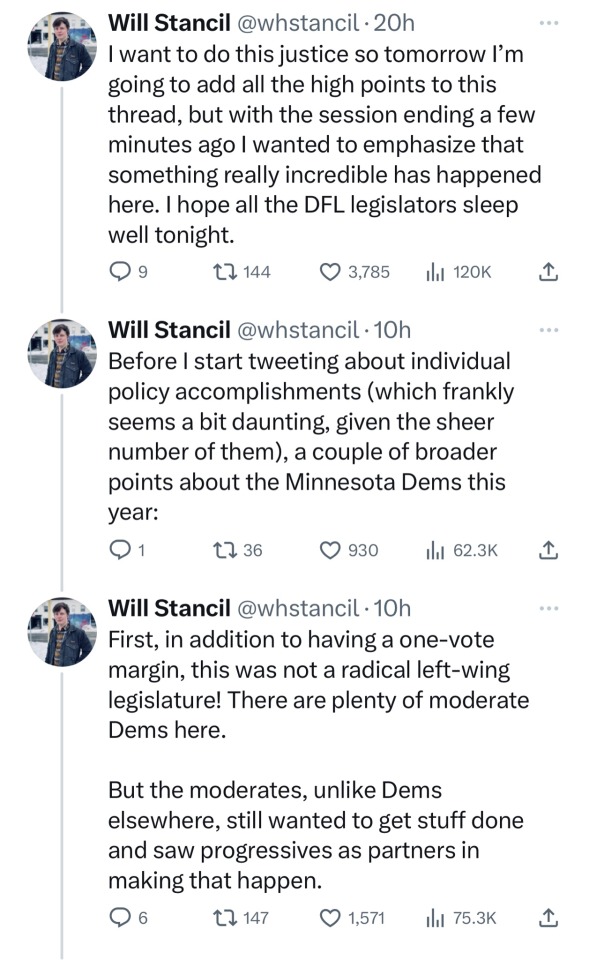
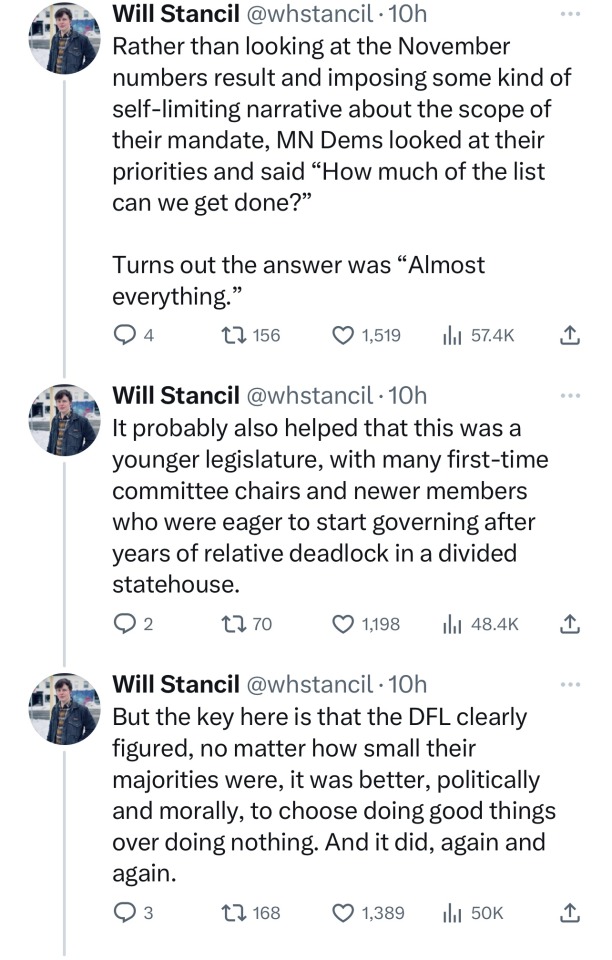
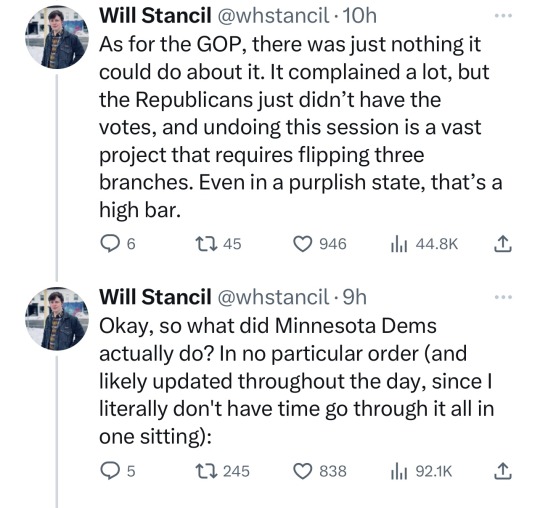
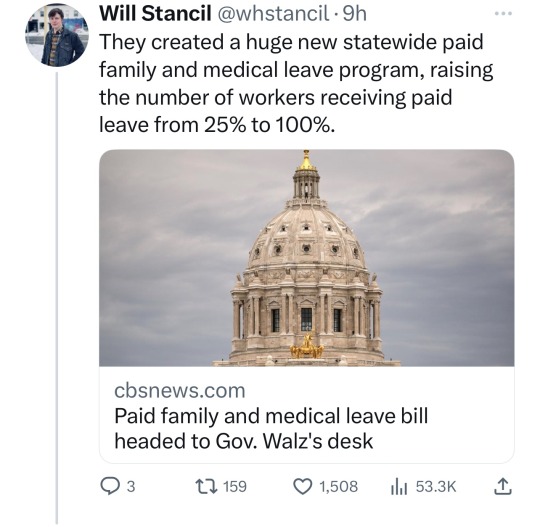




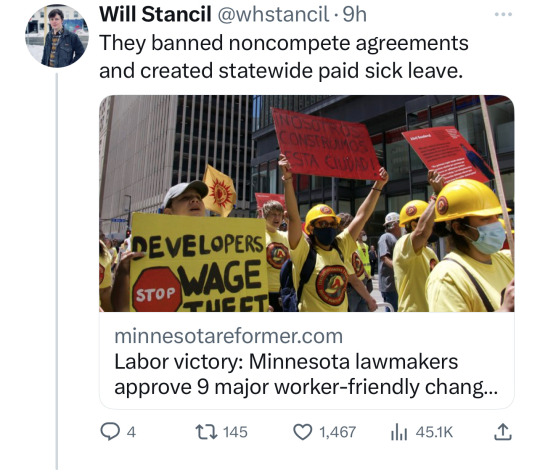
Minnesota Dems enacted a raft of laws to make the state a trans refuge, and ensure people receiving trans care here can't be reached by far-right governments in places like Florida and Texas. (link)
Minnesota Dems ensured that everyone, including undocumented immigrants, can get drivers' licenses. (link)
They made public college free for the majority of Minnesota families. (link)
Minnesota Dems dropped a billion dollars into a bevy of affordable housing programs, including by creating a new state housing voucher program. (link)
Minnesota Dems massively increased funding for the state's perpetually-underfunded public defenders, which lets more public defenders be hired and existing public defenders get a salary increase. (link)
Dems raised Minnesota education spending by 10%, or about 2.3 billion. (link)
Minnesota Dems created an energy standard for 100% carbon-free electricity by 2040. (link)
Minnesota already has some of the strongest election infrastructure (and highest voter participation) in the country, but the legislature just made it stronger, with automatic registration, preregistration for minors, and easier access to absentee ballots. (link)
Minnesota Dems expanded the publicly subsidized health insurance program to undocumented immigrants. This one's interesting because it's the sort of things Dems often balk at. The governor opposed it! The legislature rolled over him and passed it anyway. (link)
Minnesota Dems expanded background checks and enacted red-flag laws, passing gun safety measures that the GOP has thwarted for years. (link)
Minnesota Dems gave the state AG the power to block the huge healthcare mergers that have slowly gobbled up the state's medical system. (link)
Minnesota Dems restored voting rights to convicted felons as soon as they leave prison. (link)
Minnesota Dems made prison phone calls free. (link)
Minnesota Dems passed new wage protection rules for the construction industry, against industry resistance. (link)
Minnesota Dems created a new sales tax to fund bus and train lines, an enormous victory for the sustainability and quality of public transit. Transit be more pleasant to ride, more frequent, and have better shelters, along more lines. (link)
They passed strict new regulations on PFAS ("forever chemicals"). (link)
Minnesota Dems passed the largest bonding bill in state history! Funding improvements to parks, colleges, water infrastructure, bridges, etc. etc. etc. (link)
They're going to build a passenger train from the Twin Cities to Duluth. (link)
I can't even find a news story about it but there's tens of millions in funding for new BRT lines, too. (link)
A wonky-but-important change: Minnesota Dems indexed the state gas tax to inflation, effectively increasing the gas tax. (link)
They actually indexed a bunch of stuff to inflation, including the state's education funding formula, which helps ensure that school spending doesn't decline over time. (link)
Minnesota Dems made hourly school workers (e.g., bus drivers and paraprofessionals) eligible for unemployment during summer break, when they're not working or getting paid. (link)
Minnesota Dems passed a bunch of labor protections for teachers, including requiring school districts to negotiate class sizes as part of union contracts. (Yet another @SydneyJordanMN special here. (link)
Minnesota Dems created a state board to govern labor standards at nursing homes. (link)
Minnesota Dems created a Prescription Drug Affordability Board, which would set price caps for high-cost pharmaceuticals. (link)
Minnesota Dems created new worker protections for Amazon warehouse workers and refinery workers. (link)
Minnesota Dems passed a digital fair repair law, which requires electronics manufacturers to make tools and parts available so that consumers can repair their electronics rather than purchase new items. (link)
Minnesota Dems made Juneteenth a state holiday. (link)
Minnesota Dems banned conversion therapy. (link)
They spent nearly a billion dollars on a variety of environmental programs, from heat pumps to reforestation. (link)
Minnesota Dems expanded protections for pregnant and nursing workers - already in place for larger employers - to almost everyone in the state. (link)
Minnesota Dems created a new child tax credit that will cut child poverty by about a quarter. (link)
Minnesota Democrats dropped a quick $50 million into homelessness prevention programs. (link)
And because the small stuff didn't get lost in the big stuff, they passed a law to prevent catalytic converter thefts. (link)
Minnesota Dems increased child care assistance. (link)
Minnesota Dems banned "captive audience meetings," where employers force employees to watch anti-union presentations. (link)
No news story yet, but Minnesota Dems forced signal priority changes to Twin Cities transit. Right now the trains have to wait at intersections for cars, which, I can say from experience, is terrible. Soon that will change.
Minnesota Dems provided the largest increase to nursing home funding in state history. (link)
They also bumped up salaries for home health workers, to help address the shortage of in-home nurses. (link)
Minnesota Dems legalized drug paraphernalia, which allows social service providers to conduct needle exchanges and address substance abuse with reduced fear of incurring legal action. (link)
Minnesota Dems banned white supremacists and extremists from police forces, capped probation at 5 years for most crimes, improved clemency, and mostly banned no-knock warrants. (link)
Minnesota Dems also laid the groundwork for a public health insurance option. (link)
I’m happy for the people of Minnesota, but as a Floridian living under Ron DeSantis & hateful Republicans, I’m also very envious tbh. We know that democracy can work, and this is a shining example of what government could be like in the hands of legislators who actually care about helping people in need, and not pursuing the GOP’s “culture wars” and suppressing the votes of BIPOC, and inflicting maximum harm on those who aren’t cis/het, white, wealthy, Christian males. BRAVO MINNESOTA. This is how you do it! And the Minnesota Dems did it with a one seat majority, so no excuses. Forget about the next election and focus on doing as much good as you can, while you still can. 👏🏿👏🏿👏🏿👏🏿👏🏿👏🏿👏🏿
👉🏿 https://threadreaderapp.com/thread/1660846689450688514.html
#politics#minnesota#social justice#culture wars#this is what democracy looks like#republicans are evil
25K notes
·
View notes
Text
Wealth Building: Money Topics You Should Learn About If You Want To Make More Money
Budgeting: This means keeping track of how much money you have and how you spend it. It helps you save money and plan for your needs.
Investing: This is like putting your money to work so it can grow over time. It's like planting seeds to grow a money tree.
Saving: Saving is when you put some money aside for later. It's like keeping some of your treats for another day.
Debt Management: This is about handling money you owe to others, like loans or credit cards. You want to pay it back without owing too much.
Credit Scores: Think of this like a report card for your money habits. It helps others decide if they can trust you with money.
Taxation: Taxes are like a fee you pay to the government. You need to understand how they work and how to pay them correctly.
Retirement Planning: This is making sure you have enough money to live comfortably when you're older and no longer working.
Estate Planning: This is like making a plan for your stuff and money after you're no longer here.
Insurance: It's like paying for protection. You give some money to an insurance company, and they help you if something bad happens.
Investment Options: These are different ways to make your money grow, like buying parts of companies or putting money in a savings account.
Financial Markets: These are places where people buy and sell things like stocks and bonds. It can affect your investments.
Risk Management: This is about being careful with your money and making smart choices to avoid losing it.
Passive Income: This is money you get without having to work for it, like rent from a property you own.
Entrepreneurship: It's like starting your own business. You create something and try to make money from it.
Behavioral Finance: This is about understanding how your feelings and thoughts can affect how you use money. You want to make good choices even when you feel worried or excited.
Financial Goals: These are like wishes for your money. You need a plan to make them come true.
Financial Tools and Apps: These are like helpers on your phone or computer that can make it easier to manage your money.
Real Estate: This is about buying and owning property, like a house or land, to make money.
Asset Protection: It's about keeping your money safe from problems or people who want to take it.
Philanthropy: This means giving money to help others, like donating to charities or causes you care about.
Compounding Interest: This is like a money snowball. When you save or invest your money, it can grow over time. As it grows, you earn even more money on the money you already earned.
Credit Cards: When you borrow money or use a credit card to buy things, you need to show you can pay it back on time. This helps you build a good reputation with money. The better your reputation, the easier it is to borrow more money when you need it.
Alternate Currencies: These are like different kinds of money that aren't like the coins and bills you're used to like Crypto. It's digital money that's not controlled by a government. Some people use it for online shopping, and others think of it as a way to invest, like buying special tokens for a game.
1K notes
·
View notes
Text
When the app tries to make you robo-scab

When we talk about the abusive nature of gig work, there’s some obvious targets, like algorithmic wage discrimination, where two workers are paid different rates for the same job, in order to trick occasional gig-workers to give up their other sources of income and become entirely dependent on the app:
https://pluralistic.net/2023/04/12/algorithmic-wage-discrimination/#fishers-of-men
Then there’s the opacity — imagine if your boss refused to tell you how much you’ll get paid for a job until after you’ve completed it, claimed that this was done in order to “protect privacy” — and then threatened anyone who helped you figure out the true wage on offer:
https://pluralistic.net/2021/08/07/hr-4193/#boss-app
Opacity is wage theft’s handmaiden: every gig worker producing content for a social media algorithm is subject to having their reach — and hence their pay — cut based on the unaccountable, inscrutable decisions of a content moderation system:
https://pluralistic.net/2022/12/10/e2e/#the-censors-pen
Making content for an algorithm is like having a boss that docks every paycheck because you broke rules that you are not allowed to know, because if you knew the rules, you’d figure out how to cheat without your boss catching you. Content moderation is the last place where security through obscurity is considered good practice:
https://doctorow.medium.com/como-is-infosec-307f87004563
When workers seize the means of computation, amazing things happen. In Indonesia, gig workers create and trade tuyul apps that let them unilaterally modify the way that their bosses’ systems see them — everything from GPS spoofing to accessibility mods:
https://pluralistic.net/2021/07/08/tuyul-apps/#gojek
So the tech and labor story isn’t wholly grim: there are lots of ways that tech can enhance labor struggles, letting workers collaborate and coordinate. Without digital systems, we wouldn’t have the Hot Strike Summer:
https://pluralistic.net/2022/12/02/not-what-it-does/#who-it-does-it-to
As the historic writer/actor strike shows us, the resurgent labor movement and the senescent forces of crapulent capitalism are locked in a death-struggle over not just what digital tools do, but who they do it for and who they do it to:
https://locusmag.com/2022/01/cory-doctorow-science-fiction-is-a-luddite-literature/
When it comes to the epic fight over who technology acts for and against, we need a diversity of tactics, backstopped by tech operated by and for its users — and by laws that protect workers and the public. That dynamic is in sharp focus in UNITE Here Local 11’s strike against Orange County’s Laguna Cliffs Marriott Resort & Spa.
The UNITE Here strike turns on the usual issues like a living wage (hotel staff are paid so little they have to rent rooming-house beds by the shift, paying for the right to sleep in a room for a few hours at a time, without any permanent accommodation). They’re also seeking health-care and pensions, so they can be healthy at work and retire after long service. Finally, they’re seeking their employer’s support for LA’s Responsible Hotels Ordinance, which would levy a tax on hotel rooms to help pay for hotel workers’ housing costs (a hotel worker who can’t afford a bed is the equivalent of a fast food worker who has to apply for food stamps):
https://www.unitehere11.org/responsible-hotels-ordinance/
But the Marriott — which is owned by the University of California and managed by Aimbridge Hospitality — has refused to bargain, walking out negotiations.
But the employer didn’t walk out over wages, benefits or support for a housing subsidy. They walked out when workers demanded that the scabs that the company was trying to hire to break the strike be given full time, union jobs.
These aren’t just any scabs, either. They’re predominantly Black workers who rely on the $700m Instawork app for gigs. These workers are being dispatched to cross the picket line without any warning that they’re being contracted as strikebreakers. When workers refuse the cross the picket and join the strike, Instawork cancels all their shifts and permanently blocks them from new jobs.
This is a new, technologically supercharged form of illegal strikebreaking. It’s one thing for a single boss to punish a worker who refuses to scab, but Instawork acts as a plausible-deniability filter for all the major employers in the region. Like the landlord apps that allow landlords to illegally fix rents by coordinating hikes, Instawork lets bosses illegally collude to rig wages by coordinating a blocklist of workers who refuse to scab:
https://arstechnica.com/tech-policy/2022/10/company-that-makes-rent-setting-software-for-landlords-sued-for-collusion/?comments=1
The racial dimension is really important here: the Marriott has a longstanding de facto policy of refusing to hire Black workers, and whenever they are confronted with this, they insist that there are no qualified Black workers in the labor pool. But as soon as the predominantly Latino workforce struck, Marriott discovered a vast Black workforce that it could coerce into scabbing, in collusion with Instawork.
Now, all of this isn’t just sleazy, it’s illegal, a violation of Section 7 of the NLRB Act. Historically, that wouldn’t have mattered, because a string of presidents, R and D, have appointed useless do-nothing ghouls to run the NLRB. But the Biden admin, pushed by the party’s left wing, made a string of historic, excellent appointments, including NLRB General Counsel Jennifer Abruzzo, who has set her sights on punishing gig work companies for flouting labor law:
https://pluralistic.net/2022/01/10/see-you-in-the-funny-papers/#bidens-legacy
UNITE HERE 11 has brought a case to the NLRB, charging the Instawork, the UC system, Marriott, and Aimbridge with violating labor law by blackmailing gig workers into crossing the picket line. The union is also asking the NLRB to punish the companies for failing to protect workers from violent retaliation from the wealthy hotel guests who have punched them and screamed epithets at them. The hotel has refused to identify these thug guests so that the workers they assaulted can swear out complaints against them.
Writing about the strike for Jacobin, Alex N Press tells the story of Thomas Bradley, a Black worker who was struck off all Instawork shifts for refusing to cross the picket line and joining it instead:
https://jacobin.com/2023/07/southern-california-hotel-workers-strike-automated-management-unite-here
Bradley’s case is exhibit A in the UNITE HERE 11 case before the NLRB. He has a degree in culinary arts, but racial discrimination in the industry has kept him stuck in gig and temp jobs ever since he graduated, nearly a quarter century ago. Bradley lived out of his car, but that was repossessed while he slept in a hotel room that UNITE HERE 11 fundraised for him, leaving him homeless and bereft of all his worldly possessions.
With UNITE HERE 11’s help, Bradley’s secured a job at the downtown LA Westin Bonaventure Hotel & Suites, a hotel that has bargained with the workers. Bradley is using his newfound secure position to campaign among other Instawork workers to convince them not to cross picket lines. In these group chats, Jacobin saw workers worrying “that joining the strike would jeopardize their standing on the app.”

Today (July 30) at 1530h, I’m appearing on a panel at Midsummer Scream in Long Beach, CA, to discuss the wonderful, award-winning “Ghost Post” Haunted Mansion project I worked on for Disney Imagineering.

If you'd like an essay-formatted version of this thread to read or share, here's a link to it on pluralistic.net, my surveillance-free, ad-free, tracker-free blog:
https://pluralistic.net/2023/07/30/computer-says-scab/#instawork

[Image ID: An old photo of strikers before a struck factory, with tear-gas plumes rising above them. The image has been modified to add a Marriott sign to the factory, and the menacing red eye of HAL9000 from Stanley Kubrick's '2001: A Space Odyssey' to the sky over the factory. The workers have been colorized to a yellow-green shade and the factory has been colorized to a sepia tone.]

Image: Cryteria (modified) https://commons.wikimedia.org/wiki/File:HAL9000.svg
CC BY 3.0 https://creativecommons.org/licenses/by/3.0/deed.en
#pluralistic#hot strike summer#unions#UNITE HERE#labor#computer says no#tuyul apps#jacobin#gig economy#nlrb#marriott#Laguna Cliffs Marriott Resort & Spa#instawork#scabs#Aimbridge Hospitality Group#University of California#nlrb section 7#unfair labor practice#ulp#UNITE HERE Local 11#mansion tax#race#algorithmic wage discrimination#Veena Dubal#disciplinary technology#chickenized reverse-centaurs#reverse-centaurs#como is infosec#Jennifer Abruzzo
1K notes
·
View notes
Text
Research Tips for Writing Your Book
Are you diving into the exciting world of writing and researching for your book project? Here's what you need to know to make your research journey a success:
Define Your Purpose: Before diving into research, have a clear understanding of your book's purpose and goals. Know the themes you want to explore and the message you wish to convey. This will give your research a focused direction.
Create a Research Plan: Outline the specific areas you need to research, set milestones, and establish deadlines. A well-structured research plan keeps you on track and helps you manage your time efficiently.
Use Multiple Sources: Diversify your sources. Books, academic papers, interviews, and digital resources each offer unique perspectives and insights. This diversity enriches your understanding and adds depth to your writing.
Organize Your Notes: Keep your research notes well-organized. Consider using digital tools like note-taking apps or physical notebooks with labeled sections for different topics. Efficient organization will save you time and effort later.
Fact-Check: Ensure the accuracy of your research. Verify any details that are crucial to your story or argument. Misinformation can erode your credibility and disrupt the reader's immersion.
Cite Sources Properly: Keep meticulous records of your sources and be diligent about citations. Use a recognized citation style (e.g., APA, MLA, Chicago) to give credit to the authors and avoid plagiarism.
Interview Experts: Reach out to experts or people with firsthand knowledge relevant to your topic. Interviews can provide you with valuable insights, real-life experiences, and unique anecdotes to enhance your book.
Visit Relevant Places: If your book is set in a particular location, consider visiting it if possible. Experiencing the environment firsthand can help you capture its atmosphere, culture, and nuances more authentically.
Take Breaks: Research can be mentally taxing. Don't forget to take breaks to recharge and maintain a fresh perspective. Stepping away from your work can also lead to new insights and ideas.
Stay Open-Minded: Be open to unexpected discoveries during your research. Sometimes, the most profound insights come from unrelated sources or tangential information that you stumble upon while researching.
Keep a Journal: Maintain a research journal where you can jot down notes, ideas, and thoughts as they occur. This journal can serve as a valuable resource when you're writing your book.
Join Writing Communities: Connect with other writers in person or online. They can offer guidance, share their experiences, and provide emotional support when you face challenges during the research and writing process.
Revise and Refine: Don't think of research as a one-time activity. Continuously revisit and refine your research as your book evolves. New ideas or directions may emerge, and you may need to adjust your research accordingly.
Respect Copyright Laws: Understand the copyright laws applicable to your research. Ensure you have the rights to use specific materials, especially if you plan to incorporate them into your book. Obtaining permissions or licensing may be necessary.
Balance Research and Writing: While research is crucial, there comes a point where you must transition from research to writing. Avoid getting stuck in a perpetual research phase. Once you have enough information to start, begin writing and integrate research as needed in your work.
Remember that your research phase is an integral part of the creative process. It's where the foundation of your book is built, and it can be a fascinating journey in itself.But keep in mind, as you're writing your first draft, you can never know everything, never research everything. A second opinion is always good, and for that, you can ask friends, family, or even me on this blog.

#writing#writing advice#writers block#just writer things#creative writing#fanfiction writing#writing motivation#writeblr#original writing#writing reference#writing tips#writers on tumblr#writing resources#writing tip#writing encouragement#writblr#writing community#writers#world building#point of view#editing#character creation#dialogue#mine.#words
743 notes
·
View notes
Text
Storm's End - 4
“Seems like everyone on Damaxus comes here to fuel,” Jazz told Prowl.
They had split up, each taxed with scouting a different corner of the island for a spot that might serve as a base of operations. Jazz had looked around the coastline near the inn. He had found the smuggler’s cave Lockdown had once sailed his ship, the Death’s Head into, destroyed. No one had mentioned an earthquake or maybe Lockdown had done it himself. It would have been poetic to take over one of his roosts but that was fine. Ori and Rico were not back yet and so when Jazz had spotted the innkeepers’ pretty creation carrying a crate, he could not resisting walking over. Prowl was just as pretty in his neat and conservative armour as he had been nude. The Praxian was perfectly elegant, walking with a delicious swap of his ample hips.
“Did ya need any help?” He offered. The crate was full of empty bottles. The Damaxians were a hard drinking crowd when they wanted to be.
“If you wanted to grab one of the crates over there,” Prowl replied. “We sterilize the bottles and then reuse them. It saves on needless waste.”
“It’d be my pleasure,” Jazz replied.
Prowl let him through a storage room and down a flight of stairs into the cellar. Swerve had been spot on, this would have once been part of Lockdown’s lair. Where weapons and trophies would once have been held were barrels of engex and the tools of the distiller’s trade. The beauty unloaded the bottles into a sterilization system and then turned to face Jazz. There was an audible ping, at least to Jazz’s own audial horns when Prowl dimmed his optics. Jazz leaned back against the counter at his back as the Praxian leaned in. He smelled like salt air and flowers. His plating tingled as Prowl tinkled his digits down his arm.
“Perhaps I can thank you for your assistance?” The beauty asked. Jazz swallowed.
“Don’t know that I did anything that big,” he replied. “But if ya wanted to...”
“Oh I do,” Prowl assured him as he traced Jazz’s codpiece with a long, clawtipped digit.
“Oh frag,” Jazz cursed as his spike pressurized the nanoklik he authorized his panel to retract. Prowl was a soft sound, maybe a giggle as he took Jazz’s spike in his servo and stroked it twice before leaning in and wrapping his mouth around it. “Oh frag!”
Jazz did not dare risk harming Prowl in anyway.... what if his progenitor walked in? That very thought should have nullified the saboteur’s charge but he had always enjoyed a risk a little bit too much. He leaned back against the counter and watched the beautiful Praxian swallow his spike as he unclasped his armour. Prowl’s heavy wells bounced when they were freed from his armour. It took everything in Jazz’s power not to overload right then and there. No one had ever looked so perfect sucking his spike. Prowl hummed as he sucked and Jazz clenched his denta to keep from overloading too soon. The way the beauty rippled his throat around his spike, there was no way Jazz was going to last that long. He saw Prowl reach between his own legs and touch himself and he knew he was about to lose it.
“‘M gonna cum!” He warned Prowl who just leaned in and sucked a little harder. There was no helping himself, Jazz overloaded with a quiet groan, rolling his helm back as Prowl audible slurped and swallowed every last drop. “Damn, y’re somethin’ else.”
“Mmm,” Prowl hummed, licking his lipplates. “I will take that as a compliment.”
“Let me return the favour,” Jazz offered.
“Oh please do.”
They switched places. Prowl covered his mouth as Jazz knelt between his thighs and leaned. He stroked the Praxian’s node as he spread his wet folds and flicked his glossa between them. It was not long before Jazz felt his spike returning to pressure. He held Prowl’s thick thighs open as he pleasured the beauty with his mouth and digits. Though Prowl muffled his cries of pleasure, Jazz knew when he overloaded from the torrent that covered his face. Jazz rose to his peds, stroking his spike as he looked at the flushed mech below him. Prowl reached between his own thighs and held his wet, swollen folds open, inviting Jazz in. It was an invitation Jazz felt no call to ignore. He stared between the Praxian’s legs and watched himself insert his spike into the beauty’s molten centre.
“Oh frag, ya feel good,” Jazz groaned as he leaned over Prowl. He held the supine mech’s legs behind he knees as he rolled his hips, spiking the mech slowly, giving him the whole length of his thick spike before he pulled out and sank home again.
“Uhn,” Prowl moaned, tossing his helm. “That’s good. Oh... oh... You are so big.”
“Am I hurtin’ ya?” Jazz asked.
“No,” Prowl moaned. “No... harder... frag me harder.”
The gel plug of the Praxian’s gestational duct had started to reform since their last encounter but it was hardly a barrier. Jazz buried his spike in the beauty’s gestational tank and basked a moment in the tight grip of the Praxian’s rippling tunnel. Prowl squealed with delight, calling out praise for Jazz’s spike as he fragged him. Wet squelches and clangs echoed off the cellar’s stone walls. If the innkeepers found him like this... Jazz leaned his helm down and nipped the tip of the Praxian’s chevron as he spiked him with quick thrusts of his hips. Prowl crossed his legs around Jazz’s hips calling out with a throaty cry as he overloaded around Jazz’s turgid spike. His tunnel rippled around Jazz’s spike. There was no escape, not that he wanted to escape.
“Frag, y’re so fraggin’ tight,” Jazz groaned. “Gonna cum...”
“Do it,” Prowl moaned. “Oh frag, cum in me!”
“Oh frag!” Jazz obeyed, flooding the Praxian’s tank with litres of transluids before he collapsed against him. He had a bit more clarity this round than the last. “I think ya might be trouble.”
“Not to worry,” Prowl assured him. “I have an implant.”
“I shoulda asked,” Jazz apologized.
“Neither of us were quite in our right processors,” Prowl replied. They climbed up the stairs after the made themselves presentable. Cleansing wipes removed the telltale signs. It did not bother Jazz knowing that Prowl had them. He was not exactly in a position to question the other mech’s promiscuty when he was no different. In any case, Jazz saw no shame in it. As the stepped from the storage room, Prowl gasped with surprise as he looked out the window. “The sky is red!”
Jazz followed as Prowl ran from the in. He was not the only islander that ran for the docks. A crowd was gathering with those who had been waiting out the storm on their boats had climbed the masts and were pointing to the horizon. It took a few kliks before the battered ship appeared. As it limped into dock, Ori and Rico jogged up and joined Jazz in watching the spectacle. Downshift threw a roped to the beleaguered vessel so they could secure themselves to the dock. It was listing, Jazz realized. The masts were gone, blown away not by rogue waves but canon balls. The signs of a violent battle covered the sloop. Its hull must have been built from ununtrium to have survived such an attack. Prowl joined his progenitor in helping the crew off the vessel.
“We can’t have fuel leak into the bay,” Downshift said. “Might you give permission for one of our shipwrights to make emergency repairs.”
“By all means,” the mech was a curious frametype. He had features of a Urayan but not the stature. There was kibble on his back but it was no door wing. “Whatever the bill is, I can pay it.”
“No charge,” Downshift replied. “Damaxus aids any who sail into her harbour.”
“Damaxus?” The mech looked around, He held a audio player tightly in his arms. “All the stories do you a grave disservice.”
“We don’t complain,” Downshift replied. “Our inn is full but we’ll find berths for your crew.”
“Thank you. I’m Tracks, and this is Blaster,” the Urayan halfbreed replied. As he did, he threw the audio player up and it transformed into a tall mech. “We’ll only need one room. We are the crew... more or less.”
“Downshift. My creation Prowl.”
“I can bunk wit my creations,” Punch offered. “That’d leave a room free.”
“Thank you, Mech!” Blaster replied, shaking Punch’s servo. “And you, Sir. Though I was hallucinating your island.”
“Come to Storm’s End and we’ll get some fuel into you,” Downshift declared.
“What happened?” One of the fishermecha asked.
“Pirates,” Blaster said. “We sailed in the fog ‘n storm. Thought we were clear from those slagtard but then we heard the canons. Next thing, we see them firing at the waves ‘n some beast pulled ‘em down.”
“A beast?” Punch asked.
“Kraken,” Blaster replied. “Saw its shadow, a giant beast.”
“Kraken?” Someone asked. “But those are just stories.”
“Warwhale aren’t that big,” Blaster said. “‘N they don’t got that many arms.”
The pub was full of mechanisms wanting to hear their miraculous story over and over. The crew was more than just the two mech. Blaster was a cassette-carrier and his Casseticons serves as the rest of the crew. They were out of their docks, enjoying a meal as Blaster regaled the crowd again. Tracks nodded along. It seemed like Blaster did most of the talking in their relationship. Even after the beast had ripped the pirate vessel in two and dragged it into the deep, they had realized they were doom. They had already been taking on water and without sails and their engine hardly doing more than sputtering. Blaster said he heard something, like a bird call and as he bullied the shop starboard the horizon turned red and he made the decision to point their ship in that directions. The waves as much as their engine power had washed them into board. It all sounded like a sparkling fantasy but Jazz imagined he might imagine worse in the same situation.
“Ya find anythin’?” Punch asked now that they had retreated to their one room.
“No...” Jazz said. There was a knock at the door. It was Prowl with an armload of bedding. “Thank ya.
“We can drag up a cot,” Prowl offered. “Though it is not terribly comfortable. We have them in case we need to turn the pub into an emergency shelter.”
“We’re fine,” Jazz assured him. “Rico ‘n me’ve bunked together before.”
“Thank ya,” Punch said. “I don’t think I want either o’ them sulkin’ bout sore backs. ‘N it would certainly be one o’ them ‘n not me.”
“I should hope so,” Prowl agreed. There was a rumble above their helms. “It would appears the eye is passing.”
“Those mecha couldn’t o’ gotten more lucky,” Punch declared.
“I could not agree more,” Prowl said.
“Do ya normally repair broken vessels for free?” Jazz asked.
“Damaxus relies on a healthy sea,” Prowl replied. “Some ship owners pinch their shanix and will let their ships sail with cracked hauls and worse. As a community, we all agreed it was better if we see the work done ourselves for the sake of our island.”
“Shipwrights gotta fuel,” Ricochet spoke up. “Someone must pay’em.”
“We have a fund,” Prowl explained. “Everyone who can pays into it. Few on Damaxus dream of reaches. We only want to live our lives in safety and comfort. When we work together, we stand the best hope o’ it.”
“Straxus would sooner cut out in his optics,” Punch said after Prowl took his leave.
“Wonder how long it’ll last once more mecha realize that Damaxus is a paradise?” Jazz wondered out loud.
“Ya’d think they’d be tryin’ to carve out their stake already,” Punch said. “Damaxus is so close to Polyhex, I don’t know why Straxus ain’t heard o’ the boon already.”
“Maybe his scouts got eaten by sharkticon,” Jazz offered.
“Ya joke, but...” Punch hummed. “These mecha are saintly, no question. But we best remember saints can be the most ruthless killers when dealin’ wit sinners. We gotta keep our guards up, ‘cause we ain’t saints.”
#valveplug#maccadams#anon-e-miss writes#tf prowl#tf jazz#tf barricade#tf punch#tf ricochet#tf camshaft#tf downshift#mechpreg#storm's end
55 notes
·
View notes
Text
World War III: No Tanks, Just Technology and Economy ⚔️🌍

World War III is here, but it's not being fought with weapons; it's being fought through technology and the economy. Since Trump launched the trade tariff war, countries have been inspired to fight by imposing taxes to weaken their enemies. For example, China is now imposing taxes on Canada. And the real battle will soon be over artificial intelligence. Pluto in Aquarius is initiating this technological transformation, but it is with Uranus in Gemini that things will truly explode.

(by the way, I love this Gif... imagine doing this to your enemy lol... Me and my sister we fight like this... Just kidding )
Uranus in Gemini: Breakups and Revolutions in Communication
Uranus, the planet of revolutions, will disrupt communication between nations. Alliances will break apart overnight, and an old enemy could become a new ally. This will be an era where countries not only fight to develop cutting-edge AI but also to control data and infrastructure.

Hackers and Social Media Control
Hackers will become key players, targeting strategic targets like governments and banks rather than individuals. Meanwhile, social media platforms like TikTok could be controlled by governments, turning these platforms into tools of power.
Education and Work: Virtual and Automated
Education and work will become largely virtual, as you already know. AI will dominate learning systems and professional environments, making everything more automated and connected. The skills needed to survive in this digital world will focus on mastering new technologies.

Money itself will no longer be given in paper; it's already virtual. So, if you want my opinion, since cryptocurrency is already virtual, it will gain more importance now. When Uranus is in Taurus, Taurus is materialistic, Paper money is important, but not in Gemini.
In conclusion, war is no longer on the battlefield but in the digital world! Data will be the new territories to conquer. Thus, the economy—such as taxes, cryptocurrencies, and technology—such as data and innovation, are tools of power and domination in themselves. We no longer need weapons.
Share your opinion, let me know what you think:)

20 notes
·
View notes
Text
Dean Cain, who grew up in Malibu, California, told Fox News Digital that all of the homes he once lived in there, and in nearby Pacific Palisades, have been destroyed during this week’s Los Angeles-area wildfires.
"I ended up having three different houses in Pacific Palisades, one that I owned, two that I rented and lived in," Cain said. "The three of those Pacific Palisades’ [homes], all of those burned, gone. Pacific Palisades looks like someone dropped a nuclear weapon on top of it and just flattened everything. I've never seen anything like that. Also, three of the houses that I lived in in Malibu are gone."
The "Lois & Clark" star called the devastation "shocking and horrific, but not unexpected. It's part of the reason I left California was this perfect storm of mismanagement and a failure of leadership."
Cain said that when the Woolsey Fire hit in 2018, it burned his backyard but not his house.
"We're used to this in Malibu," he explained. "We get the wind, we get the fire, so we know how to deal with it. But when you have all the… tools taken away from you, no money, no brush clearance, no controlled burns, all of those things, you end up with a catastrophic situation like this."
Cain said that although his house survived the Woolsey Fire, his fire insurance was canceled afterward, adding that was part of the reason he left California for Henderson, Nevada, in 2018.
Adam Carolla Rips California Leaders For Running State ‘Into The Ground’ As Fires Rage: ‘Lunatic Nutjobs’
"There's so many of us that have been shouting from the rooftops, including President Trump, numerous times, way back in the day during his first presidency," he continued. "He's been saying it, mismanagement is going to cost you. Removing money from the fire budget is going to cost you. Not controlled burning is going to cost you. Failure to reservoir the water, it's going to cost you."
Cain placed the blame squarely on Democratic Gov. Gavin Newsom.
"You screwed up, Gavin Newsom. You screwed up," he said. "There was plenty of water. Last year was record rainfall or the year before, record rainfall. Snowmelt, reservoir the water."
Cain said his water bill was in the thousands per month when he lived in Malibu, and he couldn’t get fire insurance for less than approximately $40,000 a year.
His son helped him realize that he should leave the state by reminding him that he keeps "complaining about the tax policy, the lack of common-sense policies. Why are we living there?"
"I was like, ‘Why are we here? What am I doing?’" he said. "And it was weird to leave my home forever, but to come here now [Henderson, Nevada] and to be in this gorgeous home with great policies, you know, castle doctrine, ‘stand your ground’ stuff and things like that, I'm like, ‘Wait a minute, this makes perfect sense.’ And then to watch the disaster unfold, I'm horrified. My heart is broken for the people who are suffering at the hands of this mismanagement. But I'm hoping that that will teach them about common sense."
He added that "good times create weak men and weak men create hard times."
"Weak policy creates hard times. We're now in hard times. We need to have strong men so we can create good times again. That's the way it is. Strong men and women, sound policy. Everybody's going to be in a better position," said Cain.
Cain went on to say that he believes liberal people in Hollywood have usually "voted for all these things that really don't affect" them, "but when it does affect you — you can't get a permit to rebuild or your house burns down or people loot your home afterwards — suddenly you love the police, you love the firefighters, you love people that you've been denigrating for years. You want common sense policy."
"So once it affects you, your votes change," he said. "And I think this is going to turn a very, very blue state, much more red. I'm hoping California becomes purple and I'm hoping that — listen, my heart goes out to those who have lost everything. And I know they're going to go through years and years of red tape, nightmare, memories gone. It's going to be one of those catastrophic events in their lives. And I hope that this will wake up people so they'll start voting for policies that make sense, common sense, and they'll prepare for this sort of thing in the future."
Because he lives in the desert, Cain said he has enough food in his car to last for several days and that he and his son have satellite radios in addition to their cellphones to communicate with each other.
Like What You’re Reading? Click Here For More Entertainment News
"Not that I'm a survivalist or a prepper, because it's common sense," he said.
But, Cain said, "when you see a tragedy of this magnitude, you see how amazing the American people are, and they come together."
"And there's been an outpouring of support, food, water, necessities," he added. "We are the most giving nation in the history of mankind. We will continue to be, you know, as fractured as we can be, [but] there are times in natural disasters, in war and things of that nature, where in the United States people come together. And it's wonderful to see that happening. It's going to be a very long, tough road."
Cain noted that with the nature of the national news cycle, the wildfire devastation would be replaced by more recent news within a few weeks, "but all of these people's lives are turned upside down."
"I cannot fathom the scale of what's happened to the Palisades," he continued. "It's stunning to me. Palisades High School, gone. I mean, football games. I played at Palisades High School. Dozens… It's gone. It's just gone. Like so much of my childhood is gone. I moved away because of the terrible policies. It's just heartbreaking to see it happen. I don't want to say I told you so, but I told you so."
Cain said his mother, who is with him in Nevada, can’t stop crying watching the devastation.
"The house they built from the ground up… is gone to the ground," he said, adding, "my mom's been crying for two days."
Cain added that he feels leaving Malibu for Henderson is "one of the smartest things I've ever done."
"I feel like I've been freed," he said. "Just so many people are just going to be like, you got out just in time. And I did. And because I was blessed to have the means and I had a son, my son Christopher was like, ‘Dad, let's go.’ And life is so much easier here and so much better. Beautiful neighborhoods and much more value for your dollar… super low taxes in comparison to California, super low regulations in comparison to California. Smarter policy… we’rein the middle of the desert here in Nevada. We have better water rights, and the water is, they say it's expensive here. It's cheaper for me to get water here than it was in California… So absolutely [the] right move by me."
10 notes
·
View notes
Text
The Hidden Complexities of Managing Substantial Wealth in India

[A comprehensive guide to understanding how wealth management services help high-net-worth individuals in India]
Understanding Why Professional Wealth Management Services Matter
Managing significant wealth in India poses challenges that are more complex than standard financial planning. Leading wealth management firms offer specialized expertise to navigate complex tax regulations, family business succession, and investment strategies. High-net-worth individuals increasingly turn to professional wealth management services to handle these distinct hurdles.
The Growing Need for Expert Wealth Management Services
Take, for instance, a third-generation successful business owner in Mumbai who partnered with a wealth management company to diversify from the traditional family business into multiple ventures. Here, net worth has gone up manifold, but complexities have also increased - from compliance with multiple states' regulations to overseas investment opportunities and succession planning within a joint family structure.
How Wealth Management Firms Shape the Indian Financial Landscape
High net worth individuals in India face unique challenges that top wealth management firms help address:
Family Business Dynamics
Most Indian wealthy families rely on wealth management services to balance their family-owned businesses with personal wealth management needs.
Real Estate Holdings
Property traditionally constitutes a large part of Indian portfolios, where wealth management companies provide expertise in commercial and residential real estate management.
Gold and Alternative Investments
The cultural affinity for gold and emerging alternative investment options require specialized wealth management services to optimize returns while respecting traditional preferences.
Strategic Benefits of Professional Wealth Management Companies
Wealth management firms in India provide crucial services that transcend traditional financial planning. A full-fledged wealth management service includes:
NRI Investment Management
Leading wealth management companies excel in managing investments and compliance across borders for families with members abroad.
Tax Optimization
Professional wealth management services help navigate India's constantly changing tax scenario while maintaining compliance across jurisdictions.
Succession Planning
Experienced wealth management firms design wealth transfer strategies aligned with Indian inheritance laws and family dynamics.
Local Expertise of Indian Wealth Management Companies
The best wealth management services in India combine global best practices with deep knowledge of local markets. They offer specialized solutions for:
Traditional Business Families: Modernizing investment approaches while respecting values
First-Generation Entrepreneurs: Managing sudden wealth creation
Professional CXOs: Handling complex compensation structures
Risk Management Through Professional Wealth Management Services
Indian wealth management firms address special risk factors:
Political and Regulatory Risk
Wealth management companies protect assets from policy changes and regulatory shifts.
Currency Risk
Expert wealth management services manage exposure to rupee fluctuations.
Family Disputes
Professional wealth management firms structure wealth to prevent family disagreements.
Digital Innovation in Wealth Management Services
The contemporary wealth management company leverages technology while maintaining personal relationships:
Digital Portfolio Access: Real-time information access
Research and Insights: Market analysis through digital platforms
Virtual Consultation: Easy access to wealth advisors
Cultural Awareness in Professional Wealth Management
Indian wealth management services understand cultural nuances:
Philanthropic Planning
Wealth management firms design charitable giving aligned with Indian customs.
Marriage Planning
Professional wealth management companies balance traditional needs with modern investment strategies.
Religious Considerations
Expert wealth management services respect religious preferences in wealth distribution.
Choosing the Right Wealth Management Partner
For high-net-worth individuals in India, selecting a wealth management company means choosing a partner who understands both global practices and Indian dynamics. The ideal wealth management services bring together:
Local Market Knowledge: Understanding of Indian regulations
Global Expertise: International investment opportunities
Cultural Understanding: Appreciation of Indian values
Professional wealth management firms are essential for long-term success in India's complex financial landscape. By partnering with experienced wealth management companies, Indian high-net-worth individuals can preserve and grow their wealth while navigating unique challenges.
#wealth planning#tax regulations#wealth firms#NRI wealth#succession plans#Indian wealth#family business#real estate#gold investment#risk management#currency risk#digital wealth#Indian markets#financial planning#asset growth#wealth advisors#investment ideas#compliance tips#portfolio tools#tax savings
1 note
·
View note
Text
VAT Data Processing in ALZERP Cloud ERP Software
Key Features of ALZERP’s VAT Data Processing:
ZATCA Server Integration: ALZERP seamlessly connects with the ZATCA server using the business identification number, enabling real-time data exchange and synchronization.
Data Synchronization: The software automatically synchronizes various data points, including opening balances, purchase and LC details, VAT sales, item returns, expenses, voucher data, and data corrections.
VAT Return and Zakat Return Calculation: ALZERP accurately calculates VAT and Zakat return amounts based on the synchronized data, ensuring compliance with tax regulations.
Separate Invoice Management: Invoices from sales are created in a separate table, allowing for efficient tracking and management.
Non-VAT Invoice Processing: ALZERP automatically processes non-VAT invoices with the applicable 15% VAT amount.
Invoice Item Synchronization: Any changes made to items in VAT invoices are reflected in the corresponding non-VAT invoices, maintaining consistency.
Opening Balance Synchronization: ALZERP synchronizes opening balances for products, stock, parties, and accounts heads as of December 31, 2022.
Purchase and LC Synchronization: The software synchronizes purchase and LC data within specified date ranges, capturing all relevant transactions.
VAT Sales Synchronization: VAT sales data is synchronized, including the option to enable automatic ZATCA submission.
Sold Item Returns Synchronization: Returned items are recorded in a separate table, and existing data within the same date range is replaced.
Voucher Data Processing: ALZERP processes expenses and bookkeeping vouchers, excluding non-VATable items and focusing on relevant payment, receipt, and journal vouchers.
Data Correction and Reprocessing: The software allows for rechecking and correcting synced data, processing bank statements, and reprocessing sales as needed.






#ZATCA compliant software#VAT management#Zakat calculation software#Tax management system#ZATCA e-invoicing solution#Saudi tax compliance software#Zakat and tax automation#VAT reporting software KSA#ZATCA approved ERP#tax filing software#Zakat assessment tool#VAT return automation Saudi#ZATCA integration software#Saudi business tax management#Zakat and income tax software#Real-time VAT reporting KSA#ZATCA electronic invoicing#Saudi tax audit software#Zakat and VAT calculator#Automated tax compliance#ZATCA digital reporting platform#Saudi VAT reconciliation software#Zakat declaration software#Tax analytics for Saudi businesses#ZATCA-compliant e-invoicing system#tax planning software#Zakat and tax consultation tool#VAT management for Saudi SMEs#ZATCA data submission software#Saudi corporate tax software
0 notes
Note
hello! may i ask what device are you using to draw? You mentioned using Procreate, so i think it's an iPad, but i was wondering what model it is and if you'd recommend it for painting
hey there!
thanks for sending in an ask. i’m pretty sure i have the iPad Pro 2020, 12.9in. i use a gen 2 apple pencil with it :)
and abt digital painting etc…
i’d def recommend it for digital painting! since it’s an old model you’d prob be able to get a discount for it, or find a used one in good condition 👍👍 the screen size is sometimes excessive for me, i think the 11in model or anything smaller would work fine. only concern there would be functionality and memory, bc digital painting is very storage taxing
i’ve been using this guy for four years and she’s holding up very well. i’ve noticed that the battery is less effective (draining quicker, charging slower, etc) but it hasn’t severely inebriated my painting practice
i used to have a paper feel screen protector for it, but for the past year i’ve taken it off. i think there was just an adjustment period from traditional to digital and i hated the slippery screen, but i noticed it wore down my pen nib really quickly lol. now i use a nib with a metal tip (kinda looks like a mechanical pencil tip) and the smoothness doesn’t bother me as much. just took some time getting used to
smth abt digital painting on procreate/ipad that i both hate and love is the color display. apple color display is super good, almost too good… laptop/phone screens don’t match up and i find myself editing things for posts or printing lol. important to note, apple specifically functions in their own RGB scale, so exporting files from procreate preserves that color profile. it’s not compatible with printing, sharing, or anything LOL so be careful to convert things to sRGB (learned this the very hard way…)
i do hate procreate sometimes because their DPI is just. SOOOO low. if you transform or rotate anything then it pixelates 😭 i enabled all the hacks and nothing helped. nowadays i set up my canvas to be 3k+ pixels on at least one axis and 600dpi, it’s marginally better but i def do adjust my process to avoid any transformations 😞 maybe its just particularly bad for my style bc i like my details n Things all over the place but yeaaa prolly the biggest pitfall for ipad/procreate
another note (not rlly digital art related), i pretty much just use my ipad for digital painting, gaming sometimes (i had a crazy genshin/hsr phase), note taking on pdfs whtv. it prolly averages to ~2.5 hours per day, which isn’t a lot. so idk if you plan to use an ipad more intensively (ik some pals who deck out their ipad and basically use it as a laptop), then aforementioned problems might be a much larger issue
this got suuuuper long i apologize but all in all, ipad is def good for digital painting! it’s accessible, customizable, transportable (even with my massive 13in screen LOOOOL), and worth :) but at the end of the day, it’s a tool and its utility is what you make of it. hope i could help!
27 notes
·
View notes